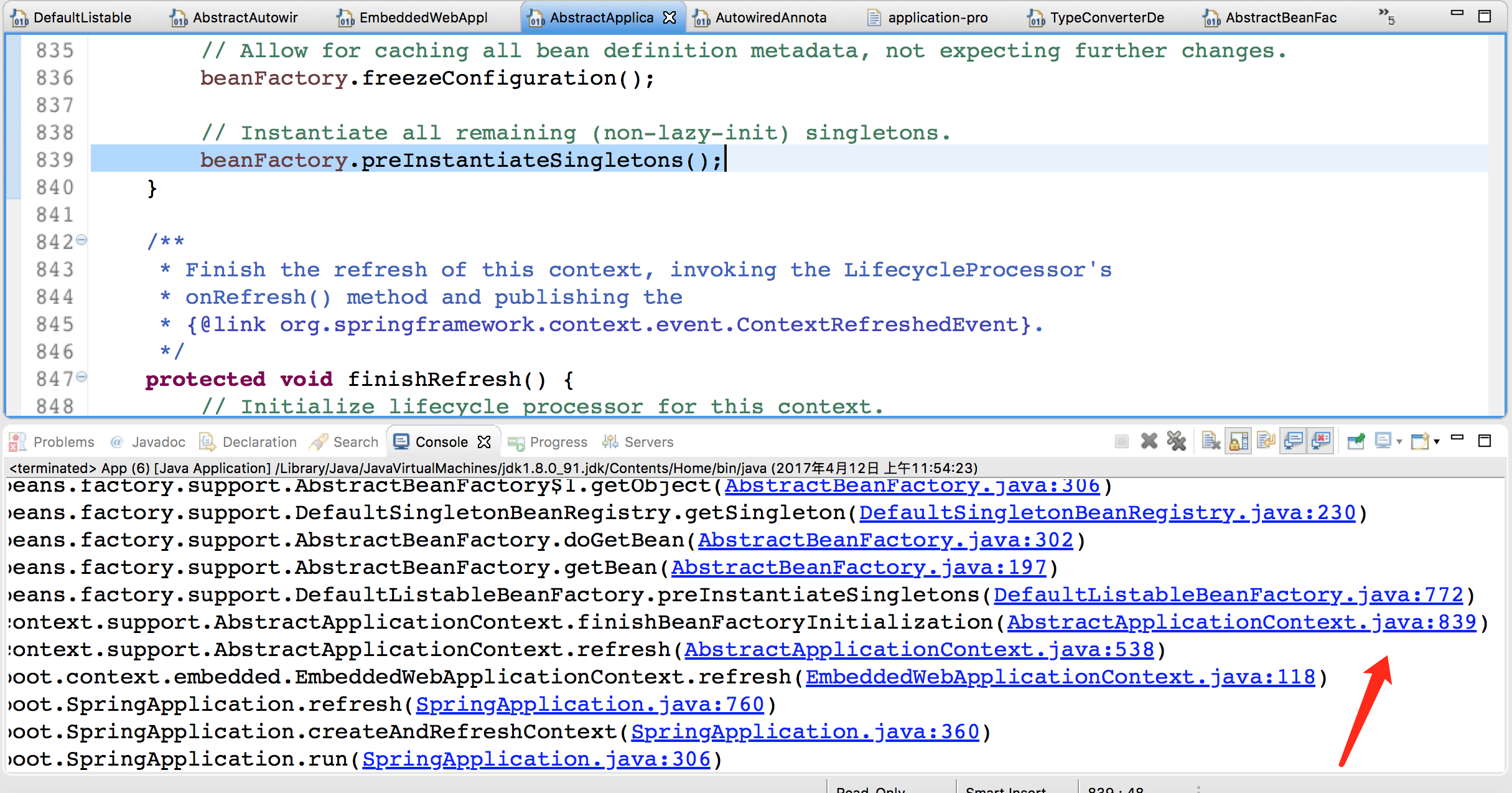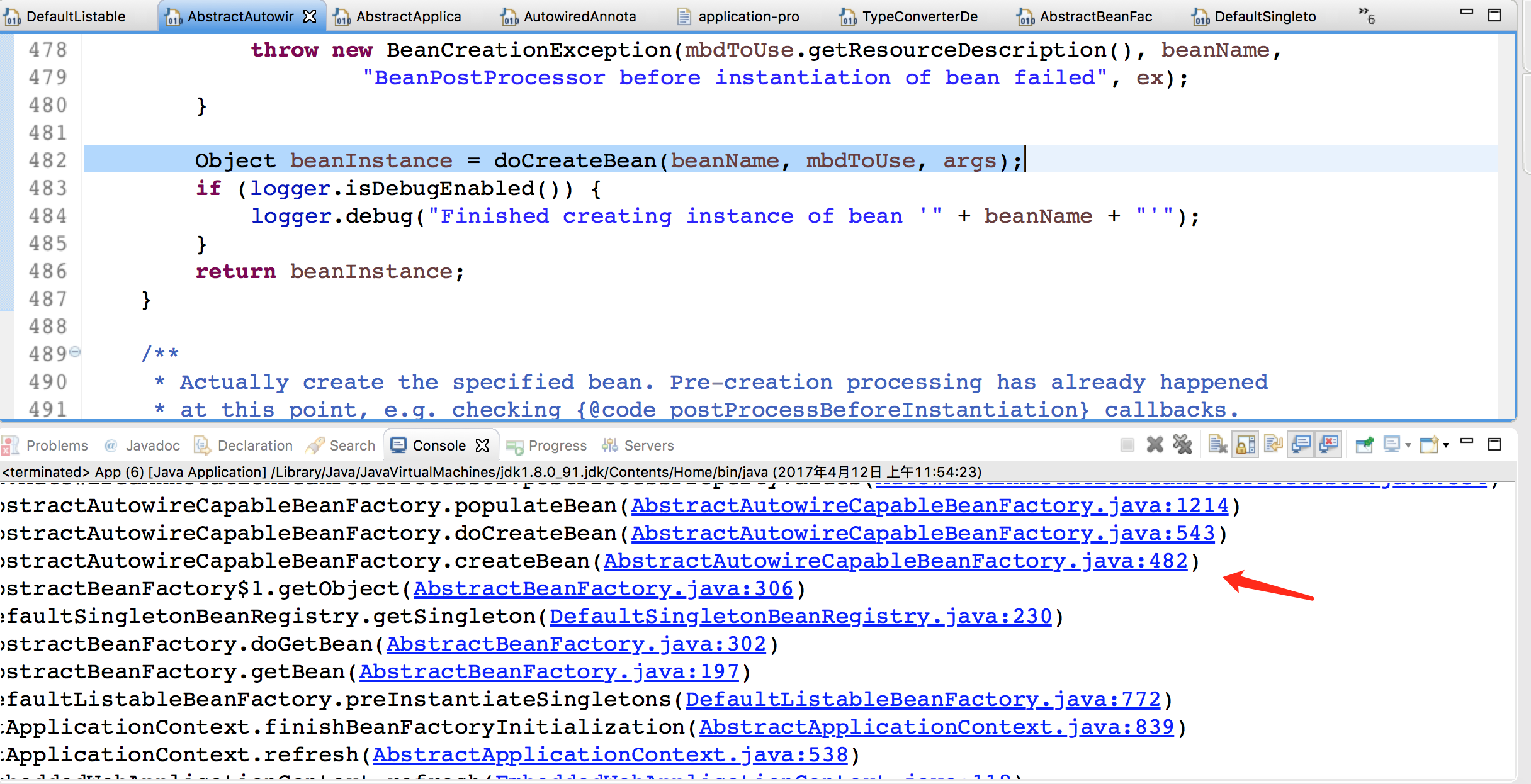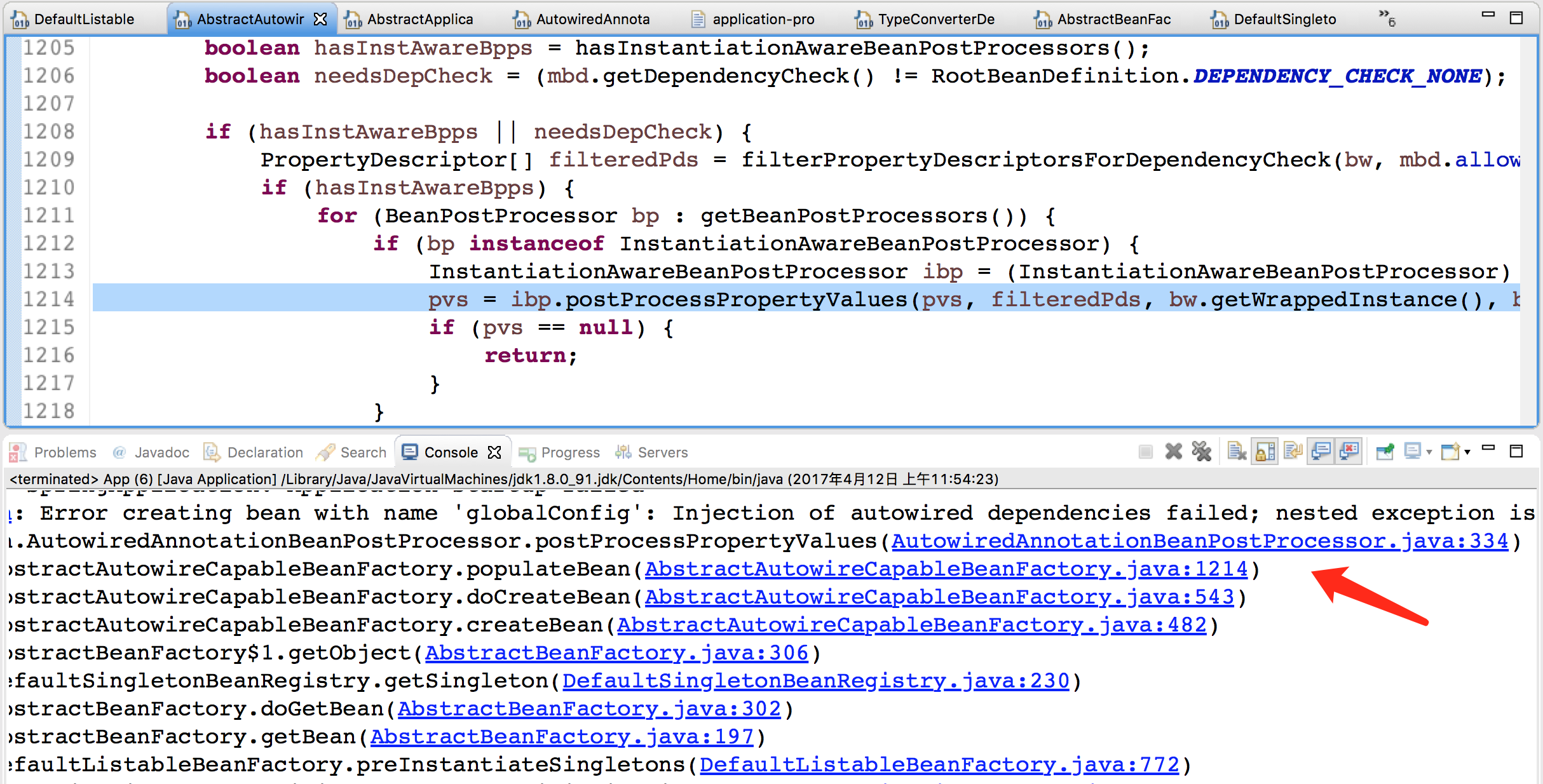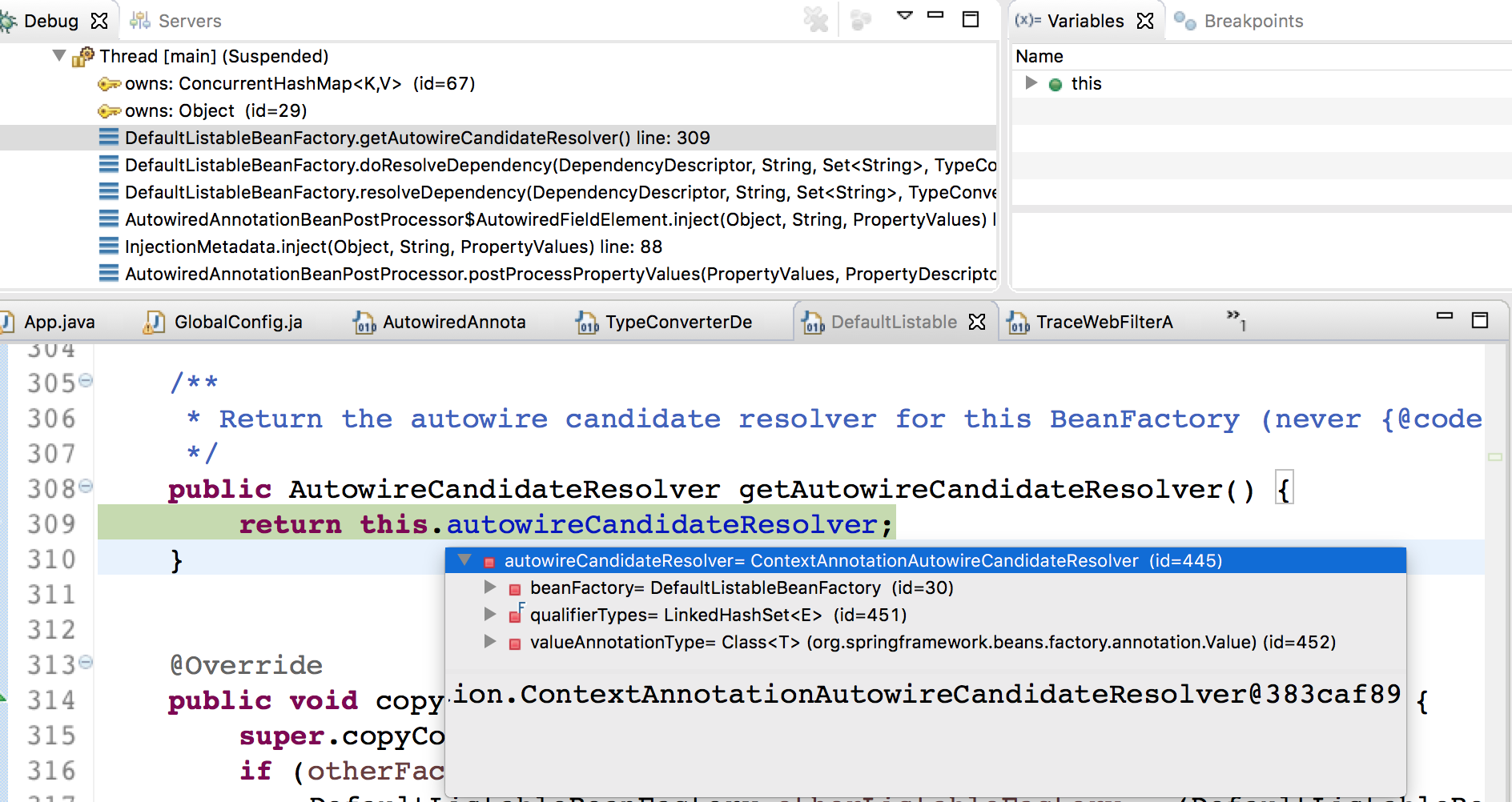

通过name来获取bean对象。

这一点eclipse就没有intelliJ好,拉到方法内部上面就不现实方法名了,这里是上面调用的方法的内部。



处理内部属性:

然后就在这里抛出异常了:

我们打个debug看看:


因为上面这个是循环处理,所以我们一直等到:

不为空:

我们进入下面的方法里看看:

不过貌似这个和我们哪个异常没有关系:



一不小心按跳过了。。。
我们继续吧:
也不是这个:

但是我们跟着走一遍没错的,然后在循环到报错的看就更清楚了:
这个跟上个不一样,这个是方法:


这个类挺有意思:

我们先来看看是哪个方法有注入需求:

下面这个应该就是核心方法了:

我们进入看看:

几组判断后进入下面方法:



return (isLazy(descriptor) ? buildLazyResolutionProxy(descriptor, beanName) : null);
一个很简单的判断:

没看清跳出来了:

又是一个非常大的方法,这就是spring。
跳出吧,我们继续我们的找异常之旅:
过了几十个,终于找到你了:

这个是个属性注入,@value嘛:


然后我们进入下一行代码:
value = beanFactory.resolveDependency(desc, beanName, autowiredBeanNames, typeConverter);
接着调用:DefaultListableBeanFacotory的方法doResolveDependency
@Override public Object resolveDependency(DependencyDescriptor descriptor, String beanName, Set<String> autowiredBeanNames, TypeConverter typeConverter) throws BeansException { descriptor.initParameterNameDiscovery(getParameterNameDiscoverer()); if (descriptor.getDependencyType().equals(javaUtilOptionalClass)) { return new OptionalDependencyFactory().createOptionalDependency(descriptor, beanName); } else if (ObjectFactory.class == descriptor.getDependencyType()) { return new DependencyObjectFactory(descriptor, beanName); } else if (javaxInjectProviderClass == descriptor.getDependencyType()) { return new DependencyProviderFactory().createDependencyProvider(descriptor, beanName); } else { Object result = getAutowireCandidateResolver().getLazyResolutionProxyIfNecessary(descriptor, beanName); if (result == null) { result = doResolveDependency(descriptor, beanName, autowiredBeanNames, typeConverter); } return result; } } public Object doResolveDependency(DependencyDescriptor descriptor, String beanName, Set<String> autowiredBeanNames, TypeConverter typeConverter) throws BeansException { Class<?> type = descriptor.getDependencyType();
//获取注解@value的值 Object value = getAutowireCandidateResolver().getSuggestedValue(descriptor); if (value != null) { if (value instanceof String) { String strVal = resolveEmbeddedValue((String) value); BeanDefinition bd = (beanName != null && containsBean(beanName) ? getMergedBeanDefinition(beanName) : null); value = evaluateBeanDefinitionString(strVal, bd); } TypeConverter converter = (typeConverter != null ? typeConverter : getTypeConverter()); return (descriptor.getField() != null ? converter.convertIfNecessary(value, type, descriptor.getField()) : converter.convertIfNecessary(value, type, descriptor.getMethodParameter())); } if (type.isArray()) { Class<?> componentType = type.getComponentType(); DependencyDescriptor targetDesc = new DependencyDescriptor(descriptor); targetDesc.increaseNestingLevel(); Map<String, Object> matchingBeans = findAutowireCandidates(beanName, componentType, targetDesc); if (matchingBeans.isEmpty()) { if (descriptor.isRequired()) { raiseNoSuchBeanDefinitionException(componentType, "array of " + componentType.getName(), descriptor); } return null; } if (autowiredBeanNames != null) { autowiredBeanNames.addAll(matchingBeans.keySet()); } TypeConverter converter = (typeConverter != null ? typeConverter : getTypeConverter()); Object result = converter.convertIfNecessary(matchingBeans.values(), type); if (getDependencyComparator() != null && result instanceof Object[]) { Arrays.sort((Object[]) result, adaptDependencyComparator(matchingBeans)); } return result; } else if (Collection.class.isAssignableFrom(type) && type.isInterface()) { Class<?> elementType = descriptor.getCollectionType(); if (elementType == null) { if (descriptor.isRequired()) { throw new FatalBeanException("No element type declared for collection [" + type.getName() + "]"); } return null; } DependencyDescriptor targetDesc = new DependencyDescriptor(descriptor); targetDesc.increaseNestingLevel(); Map<String, Object> matchingBeans = findAutowireCandidates(beanName, elementType, targetDesc); if (matchingBeans.isEmpty()) { if (descriptor.isRequired()) { raiseNoSuchBeanDefinitionException(elementType, "collection of " + elementType.getName(), descriptor); } return null; } if (autowiredBeanNames != null) { autowiredBeanNames.addAll(matchingBeans.keySet()); } TypeConverter converter = (typeConverter != null ? typeConverter : getTypeConverter()); Object result = converter.convertIfNecessary(matchingBeans.values(), type); if (getDependencyComparator() != null && result instanceof List) { Collections.sort((List<?>) result, adaptDependencyComparator(matchingBeans)); } return result; } else if (Map.class.isAssignableFrom(type) && type.isInterface()) { Class<?> keyType = descriptor.getMapKeyType(); if (String.class != keyType) { if (descriptor.isRequired()) { throw new FatalBeanException("Key type [" + keyType + "] of map [" + type.getName() + "] must be [java.lang.String]"); } return null; } Class<?> valueType = descriptor.getMapValueType(); if (valueType == null) { if (descriptor.isRequired()) { throw new FatalBeanException("No value type declared for map [" + type.getName() + "]"); } return null; } DependencyDescriptor targetDesc = new DependencyDescriptor(descriptor); targetDesc.increaseNestingLevel(); Map<String, Object> matchingBeans = findAutowireCandidates(beanName, valueType, targetDesc); if (matchingBeans.isEmpty()) { if (descriptor.isRequired()) { raiseNoSuchBeanDefinitionException(valueType, "map with value type " + valueType.getName(), descriptor); } return null; } if (autowiredBeanNames != null) { autowiredBeanNames.addAll(matchingBeans.keySet()); } return matchingBeans; } else { Map<String, Object> matchingBeans = findAutowireCandidates(beanName, type, descriptor); if (matchingBeans.isEmpty()) { if (descriptor.isRequired()) { raiseNoSuchBeanDefinitionException(type, "", descriptor); } return null; } if (matchingBeans.size() > 1) { String primaryBeanName = determineAutowireCandidate(matchingBeans, descriptor); if (primaryBeanName == null) { throw new NoUniqueBeanDefinitionException(type, matchingBeans.keySet()); } if (autowiredBeanNames != null) { autowiredBeanNames.add(primaryBeanName); } return matchingBeans.get(primaryBeanName); } // We have exactly one match. Map.Entry<String, Object> entry = matchingBeans.entrySet().iterator().next(); if (autowiredBeanNames != null) { autowiredBeanNames.add(entry.getKey()); } return entry.getValue(); } }
所以我怀疑在上面的地方开始处理@value的值,这里关系到后面的只是${env.isdev}还是true
========
Object value = getAutowireCandidateResolver().getSuggestedValue(descriptor);


可能有很多annotations吧

然后就到了find..



注意这是的value值已经是“${env.isDev}”了。
所以我们分析完这个===中的内容了。
========
我们由上面标黄的代码进入:
//org.springframework.beans.TypeConverterDelegate
/** * Convert the value to the specified required type. * @param newValue the proposed new value * @param requiredType the type we must convert to * (or {@code null} if not known, for example in case of a collection element) * @param methodParam the method parameter that is the target of the conversion * (may be {@code null}) * @return the new value, possibly the result of type conversion * @throws IllegalArgumentException if type conversion failed */ public <T> T convertIfNecessary(Object newValue, Class<T> requiredType, MethodParameter methodParam) throws IllegalArgumentException { return convertIfNecessary(null, null, newValue, requiredType, (methodParam != null ? new TypeDescriptor(methodParam) : TypeDescriptor.valueOf(requiredType))); }
里面只有一个方法:
/** * Convert the value to the required type (if necessary from a String), * for the specified property. * @param propertyName name of the property * @param oldValue the previous value, if available (may be {@code null}) * @param newValue the proposed new value * @param requiredType the type we must convert to * (or {@code null} if not known, for example in case of a collection element) * @param typeDescriptor the descriptor for the target property or field * @return the new value, possibly the result of type conversion * @throws IllegalArgumentException if type conversion failed */ @SuppressWarnings("unchecked") public <T> T convertIfNecessary(String propertyName, Object oldValue, Object newValue, Class<T> requiredType, TypeDescriptor typeDescriptor) throws IllegalArgumentException { // Custom editor for this type? PropertyEditor editor = this.propertyEditorRegistry.findCustomEditor(requiredType, propertyName); ConversionFailedException conversionAttemptEx = null; // No custom editor but custom ConversionService specified? ConversionService conversionService = this.propertyEditorRegistry.getConversionService(); if (editor == null && conversionService != null && newValue != null && typeDescriptor != null) { TypeDescriptor sourceTypeDesc = TypeDescriptor.forObject(newValue); if (conversionService.canConvert(sourceTypeDesc, typeDescriptor)) { try { return (T) conversionService.convert(newValue, sourceTypeDesc, typeDescriptor); } catch (ConversionFailedException ex) { // fallback to default conversion logic below conversionAttemptEx = ex; } } } //根据debug直接进入了下面这个判断 Object convertedValue = newValue; // Value not of required type? if (editor != null || (requiredType != null && !ClassUtils.isAssignableValue(requiredType, convertedValue))) { if (typeDescriptor != null && requiredType != null && Collection.class.isAssignableFrom(requiredType) && convertedValue instanceof String) { TypeDescriptor elementTypeDesc = typeDescriptor.getElementTypeDescriptor(); if (elementTypeDesc != null && Enum.class.isAssignableFrom(elementTypeDesc.getType())) { convertedValue = StringUtils.commaDelimitedListToStringArray((String) convertedValue); } } if (editor == null) { editor = findDefaultEditor(requiredType); } convertedValue = doConvertValue(oldValue, convertedValue, requiredType, editor); } boolean standardConversion = false; if (requiredType != null) { // Try to apply some standard type conversion rules if appropriate. if (convertedValue != null) { if (Object.class == requiredType) { return (T) convertedValue; } else if (requiredType.isArray()) { // Array required -> apply appropriate conversion of elements. if (convertedValue instanceof String && Enum.class.isAssignableFrom(requiredType.getComponentType())) { convertedValue = StringUtils.commaDelimitedListToStringArray((String) convertedValue); } return (T) convertToTypedArray(convertedValue, propertyName, requiredType.getComponentType()); } else if (convertedValue instanceof Collection) { // Convert elements to target type, if determined. convertedValue = convertToTypedCollection( (Collection<?>) convertedValue, propertyName, requiredType, typeDescriptor); standardConversion = true; } else if (convertedValue instanceof Map) { // Convert keys and values to respective target type, if determined. convertedValue = convertToTypedMap( (Map<?, ?>) convertedValue, propertyName, requiredType, typeDescriptor); standardConversion = true; } if (convertedValue.getClass().isArray() && Array.getLength(convertedValue) == 1) { convertedValue = Array.get(convertedValue, 0); standardConversion = true; } if (String.class == requiredType && ClassUtils.isPrimitiveOrWrapper(convertedValue.getClass())) { // We can stringify any primitive value... return (T) convertedValue.toString(); } else if (convertedValue instanceof String && !requiredType.isInstance(convertedValue)) { if (conversionAttemptEx == null && !requiredType.isInterface() && !requiredType.isEnum()) { try { Constructor<T> strCtor = requiredType.getConstructor(String.class); return BeanUtils.instantiateClass(strCtor, convertedValue); } catch (NoSuchMethodException ex) { // proceed with field lookup if (logger.isTraceEnabled()) { logger.trace("No String constructor found on type [" + requiredType.getName() + "]", ex); } } catch (Exception ex) { if (logger.isDebugEnabled()) { logger.debug("Construction via String failed for type [" + requiredType.getName() + "]", ex); } } } String trimmedValue = ((String) convertedValue).trim(); if (requiredType.isEnum() && "".equals(trimmedValue)) { // It's an empty enum identifier: reset the enum value to null. return null; } convertedValue = attemptToConvertStringToEnum(requiredType, trimmedValue, convertedValue); standardConversion = true; } else if (convertedValue instanceof Number && Number.class.isAssignableFrom(requiredType)) { convertedValue = NumberUtils.convertNumberToTargetClass( (Number) convertedValue, (Class<Number>) requiredType); standardConversion = true; } } else { // convertedValue == null if (javaUtilOptionalEmpty != null && requiredType.equals(javaUtilOptionalEmpty.getClass())) { convertedValue = javaUtilOptionalEmpty; } } if (!ClassUtils.isAssignableValue(requiredType, convertedValue)) { if (conversionAttemptEx != null) { // Original exception from former ConversionService call above... throw conversionAttemptEx; } else if (conversionService != null) { // ConversionService not tried before, probably custom editor found // but editor couldn't produce the required type... TypeDescriptor sourceTypeDesc = TypeDescriptor.forObject(newValue); if (conversionService.canConvert(sourceTypeDesc, typeDescriptor)) { return (T) conversionService.convert(newValue, sourceTypeDesc, typeDescriptor); } } // Definitely doesn't match: throw IllegalArgumentException/IllegalStateException StringBuilder msg = new StringBuilder(); msg.append("Cannot convert value of type [").append(ClassUtils.getDescriptiveType(newValue)); msg.append("] to required type [").append(ClassUtils.getQualifiedName(requiredType)).append("]"); if (propertyName != null) { msg.append(" for property '").append(propertyName).append("'"); } if (editor != null) { msg.append(": PropertyEditor [").append(editor.getClass().getName()).append( "] returned inappropriate value of type [").append( ClassUtils.getDescriptiveType(convertedValue)).append("]"); throw new IllegalArgumentException(msg.toString()); } else { msg.append(": no matching editors or conversion strategy found"); throw new IllegalStateException(msg.toString()); } } } if (conversionAttemptEx != null) { if (editor == null && !standardConversion && requiredType != null && Object.class != requiredType) { throw conversionAttemptEx; } logger.debug("Original ConversionService attempt failed - ignored since " + "PropertyEditor based conversion eventually succeeded", conversionAttemptEx); } return (T) convertedValue; }


注意上面的红箭头,我们需要适配的类型是Bloolean类型。

这里的convertedvalue是一个string对象。
继续:

进入第二个判断:

if (requiredType != null && !requiredType.isArray() && convertedValue instanceof String[])
很显然"${env.isDev}"不是一个string[]类型。
最终进入第三组判断,这次对了:


由最开始的异常跟踪我们知道,就是在这里抛的异常了。

Object org.springframework.beans.TypeConverterDelegate.doConvertTextValue(Object oldValue, String newTextValue, PropertyEditor editor)
三个参数oldValue, newTextValue, editor的值分别是,null,${env.isDev},org.springframework.beans.propertyeditors.CustomBooleanEditor@7c1447b5


就是这里了


最后没有一个匹配上的就爆异常了。
所以我怀疑那里的参数是不对的。
我现在这里打个端点,方便等会直接到这里查看:
